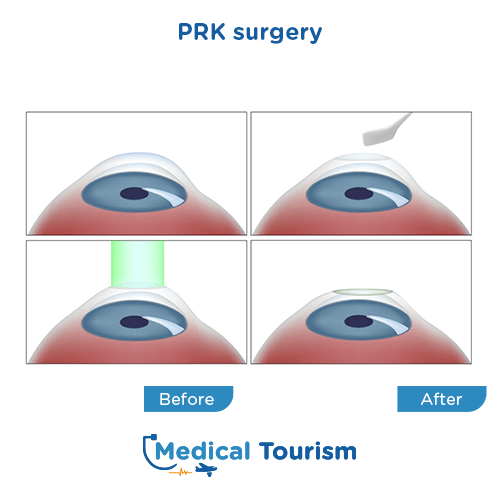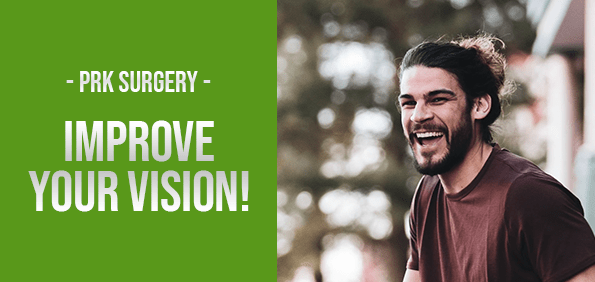The best board-certified doctors abroad
PRK surgery information and international destinations
The LASIK procedure's predecessor, PRK, was the first kind of laser surgery. Although it requires a longer recovery period, it has the advantage of being able to treat patients with thinner corneas and is effective for treating myopia, hyperopia, and astigmatism.
After administering anesthesia to the patient's eye, the surgeon carefully removes the epithelium, the cornea's outer layer. After that, the cornea's surface is reshaped using an ultraviolet light beam. After surgery, the epithelium will regenerate.
Get PRK surgery with the best international destinations!
Benefits
No more glasses
High rates of success
It's a simple procedure
Recommended for those with thin corneas
High rates of success
It's a simple procedure
Recommended for those with thin corneas
PRK surgery
Procedure:
15 min.
Hospital stay: 10 min.
Cleared to fly: 1 day
Hospital stay: 10 min.
Cleared to fly: 1 day
After surgery
Out of town patients’ follow-ups are scheduled with the ophthalmologist after 1- 7 days from prk. Patients are clear for flying after 1 - 7 days from prk.
Note: Follow-ups can be arranged as face-to-face or virtually. If needed, you can go to your primary care physician to remove sutures or get medication adjustments.
Before and after images
View additional images for this procedure.

View more


Locations
Select the city of your choice to seethe doctors profile.
Dr. Nicolas J. Broghera
View more

PRK frequent questions
Get answers to our most frequently asked questions and what to expect after the surgery
Do I qualify for PRK surgery?
Applicants for surgery either have astigmatism, myopia, or both, or they don't want to use contacts or glasses any longer. For patients who are unsuitable for LASIK, this procedure may be an option. To find out if you are a candidate for this surgery, we advise you to consult one of our qualified doctors.
How should I prepare for a PRK procedure?
Your eye will be examined by a specialist to ascertain its condition, pupil size, and corneal shape. Prior to surgery, you will typically be asked by your doctor to stop wearing your contact lenses and corrective lenses for three days.
Will I be in pain during surgery?
You will only feel pressure during surgery after your doctor applies drops to numb your eyes.
What occurs following surgery?
You can feel some irritation and burn just after the treatment, and your eyes might start to water. If your medical professionals think is necessary, you must wear sunglasses when you are outside. Your vision will first seem to be growing worse, but after three to five days, it will start to improve.
What is the difference between PRK and LASIK?
Lasik is a newer surgery that just requires a small flap to be produced on top of the cornea before a laser is used to work beneath the cornea. The cornea's outer layer is removed during LASIK surgery, and ultraviolet light is then injected right into the cornea. Some surgeons may favor one procedure over another or opt for the one that will benefit the patient the most. To establish which operation is best for you, we advise you to consult one of our qualified doctors.
Will I require corrective surgery?
Most patients won't require correction surgery, but those with more serious issues may experience an under-correction and require additional surgery. Patients may decide to undergo a correction if their vision changes as a result of pregnancy or other conditions in some circumstances. In a few years, patients over 40 may require reading glasses.
Disclaimer: This information does not reflect the medical advice from our clinics. All cases are different and this treatment may not suit you. Always refer to a medical professional with the certification and experience. All of our physicians are fully qualified to perform these procedures. For more information and diagnosis contact one of our top specialized clinics.
In all medical procedures, there are chances of complications, the specialist will provide you detailed information about the risks of the procedure, talk to the specialist directly.
In all medical procedures, there are chances of complications, the specialist will provide you detailed information about the risks of the procedure, talk to the specialist directly.

